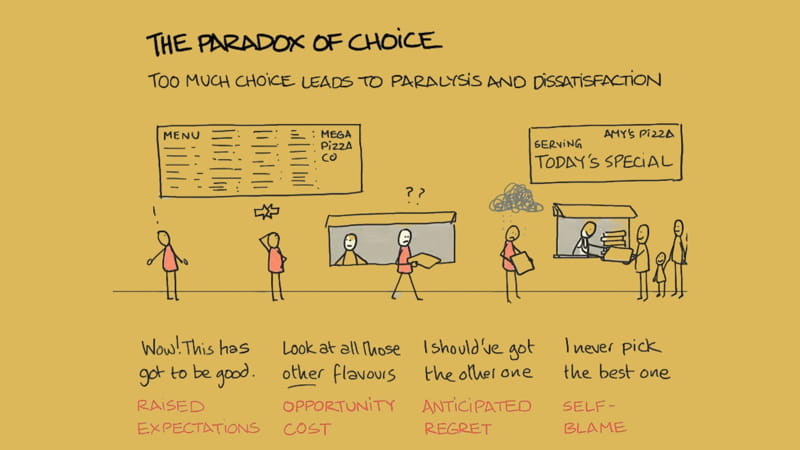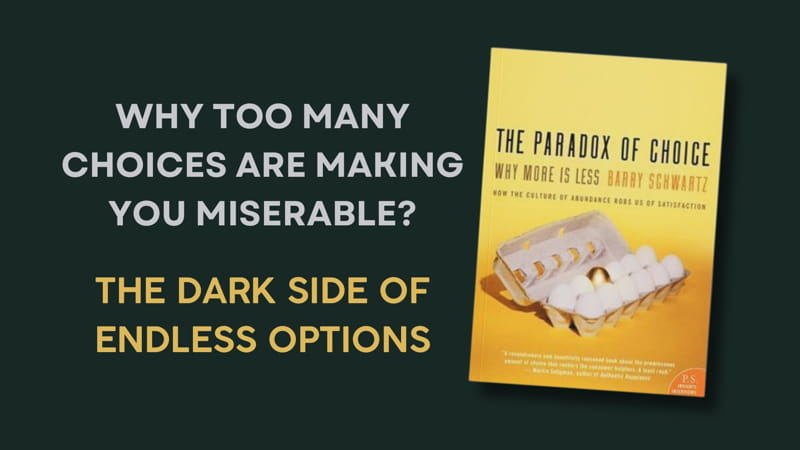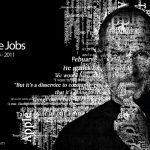In today’s consumer-driven world, we’re constantly bombarded with options. Whether it’s shopping online, picking a restaurant, or deciding on a career, the endless array of choices might seem empowering, but it’s secretly eroding your happiness. Instead of making life easier, excessive choices are making you anxious, dissatisfied, and, in many cases, paralyzed.
Barry Schwartz’s The Paradox of Choice dives deep into this hidden struggle, revealing how the abundance of options often leads to unhappiness and regret rather than freedom and satisfaction. Let’s uncover how the overwhelming nature of choice impacts you—and why it’s time to rethink the “more is better” mindset.
The Hidden Burden of Choice Overload

Fact: 54% of shoppers feel overwhelmed by the number of product options available online, leading to decision fatigue.
Schwartz introduces the concept of choice overload, where too many options result in stress, confusion, and second-guessing. Imagine browsing through hundreds of similar products on Amazon, trying to pick the “perfect” one, only to end up feeling drained instead of accomplished.
| Scenario | Impact |
|---|---|
| Shopping during a mega sale | Leads to impulsive and regretful buys |
| Browsing through endless deals | Causes analysis paralysis |
| Comparing gadgets or clothing | Results in hours of wasted time |
Instead of empowerment, choice overload leaves you with a nagging sense of dissatisfaction.
Are You a Maximizer or a Satisficer?
Fact: Maximizers, who aim for perfection, are 30% more likely to experience post-purchase regret compared to satisficers.
- Maximizers: Constantly search for the “absolute best” choice but often end up disappointed and exhausted.
- Satisficers: Set clear criteria, choose what meets their needs, and feel content.
If you’re the type to scroll through endless reviews, compare every feature, and question your final decision, you’re likely a maximizer—and it’s draining your mental energy.
The Cost of Opportunity: What You Didn’t Choose Haunts You
Every decision comes with a cost of opportunity, or the potential loss of benefits from the options you didn’t pick. Schwartz explains that this regret often leaves us dwelling on “what if” scenarios.
| Scenario | Missed Opportunity |
|---|---|
| Choosing a sale on one item | Missing out on discounts elsewhere |
| Buying a mid-range product | Wondering if the premium option was better |
This constant second-guessing diminishes the joy of your purchase.
Unrealistic Expectations Set You Up to Fail
The more choices we have, the higher our expectations become. Schwartz warns that unrealistic standards can lead to dissatisfaction when reality doesn’t measure up.
Example: Ever splurged on a highly-rated product after reading glowing reviews, only to find it underwhelming? High expectations often leave us feeling cheated, even when the product meets reasonable standards.
Choice Paralysis: When Too Many Options Freeze You
Fact: Over 50% of consumers abandon their online shopping carts because they can’t decide what to buy.
Schwartz calls this decision paralysis—the inability to make a choice due to feeling overwhelmed by options. It’s why you might spend hours comparing products only to end up buying nothing or procrastinating decisions entirely.
More Choices Don’t Equal More Happiness
Fact: Studies reveal that people with fewer options report higher satisfaction than those with excessive choices.
We’re conditioned to believe that having more options will make us happier, but in reality, it often has the opposite effect. Too many options dilute the satisfaction of the choice we eventually make.
| Number of Options | Satisfaction Level |
|---|---|
| Limited (3-5 choices) | Higher satisfaction |
| Extensive (15+ choices) | Lower satisfaction, more regret |
Simplify to Avoid Decision Fatigue
Schwartz advises simplifying your options to reduce stress and improve satisfaction.
How to Simplify Choices:
- Limit Your Options: Compare only 3-5 items instead of browsing endlessly.
- Set Criteria: Define your budget and priorities before shopping.
- Avoid FOMO: Focus on what’s right for you, not on what others recommend.
This mindset is especially helpful during mega sales like Black Friday, where the sheer volume of deals can easily overwhelm.
Cultural Pressures Make It Worse
In individualistic societies, people are taught that their choices define them. Schwartz argues that this pressure amplifies anxiety, as we’re constantly trying to make “perfect” decisions to fit societal expectations.
Reframe Your Relationship with Choice
Not every choice needs to be perfect. Schwartz encourages reframing your mindset: view choices as tools, not a source of validation.
Tips to Reframe:
- Stop overthinking minor decisions—most won’t matter in the long run.
- Focus on what aligns with your personal values, rather than external pressures.
Happiness Comes from Contentment, Not More Choices
True happiness, Schwartz argues, isn’t about making the perfect choice. It’s about being content with what you have.
Mindfulness, self-awareness, and limiting comparisons can help reduce decision-related stress and improve well-being.
The Hidden Dangers of Sales and Discounts
For shopaholics and online buyers, sales might feel like an opportunity to snag great deals, but they often worsen decision fatigue.
The Dark Side of Sales:
- Overwhelm: Mega sales feature too many products, leading to confusion.
- Regret: Buying impulsively often results in post-purchase dissatisfaction.
- Wasted Time: Endless comparisons steal hours that could be spent elsewhere.
| Problem | Solution |
|---|---|
| Overwhelmed by sales | Focus on items you need, not everything on sale |
| Impulse buying | Stick to a budget or shopping list |
| Decision fatigue | Limit browsing time |
Final Takeaway: The Illusion of Freedom
Barry Schwartz’s The Paradox of Choice reveals an uncomfortable truth: having more options often makes us less happy, not more. If you constantly feel overwhelmed, dissatisfied, or regretful about your choices, it might be time to rethink how you approach decisions.
Remember, less is more—not just a cliché, but a proven strategy for reclaiming your time, energy, and happiness. Simplify your choices, focus on what matters, and stop letting an abundance of options control your life.
Liked it, our perspective. For more critical analysis and book reviews: Pocketandplans.com







